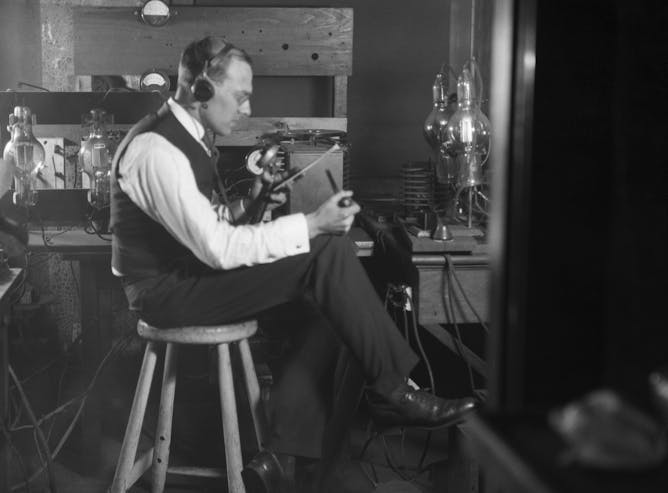|
|
|
|
For centuries, people largely read politicians’ words. But then, a century ago, the first-ever commercial radio broadcast announced the results of the 1920 presidential race.
Ever since then – first on the radio, then through TV and social media – politicians’ ability to engage and entertain has become a crucial component of their candidacies. As a result, we’ve elected a president with movie-star looks – and one actual movie star – an orator who could enrapture audiences with his soaring rhetoric and well-timed zingers, and a populist who mastered the art of the tweet.
But as the quality of political discourse deteriorates because of the focus on entertaining, what, wonders IUPUI’s Richard Gunderman, has been lost?
Also today:
|
Nick Lehr
Arts + Culture Editor
|

|
|

When Frank Conrad broadcast the results of the 1920 presidential election, he had no idea that politics would be forever transformed.
Bettmann via Getty Images
Richard Gunderman, Indiana University
For centuries, people largely read politicians' words. But with the advent of radio, the ability of politicians to engage and entertain became crucial components of their candidacies.
|
Science + Technology
|
-
Richard Forno, University of Maryland, Baltimore County
A ransomware attack on election-related government computers in a Georgia county raises the specter of more disruptions for Election Day voting and vote tabulation.
-
Chris Impey, University of Arizona
The scariest beast in the universe has an insatiable appetite and shreds its victims.
-
Kolina Koltai, University of Washington
That "friend of a friend" post you're thinking about sharing on social media could make you an unwitting accomplice in a disinformation campaign.
-
Jayur Mehta, Florida State University
Five centuries before Columbus arrived, migrants were spreading across North America, carrying their culture with them and mixing with those they encountered in new places.
|
|
Politics/Election '20
|
-
Richard Pildes, New York University
Federal election law is riddled with uncertainties. And that's not a good situation for the country if it finds itself in the middle of a contested election.
-
Alexander Hinton, Rutgers University - Newark
With a hotly contested election underway in a polarized society, many people are concerned about far-right extremism. But they may not understand the real threat.
-
Peter Erickson, Colorado State University
Candidates from both the right and the left use the escalator as a metaphor for the economic perils – and perks – of upward social mobility.
|
|
Economy + Business
|
-
Jeffrey Dukes, Purdue University
A diverse group of experts including representatives of oil companies and banks unanimously agreed that climate change poses an existential threat to the financial system.
-
Bryan Keogh, The Conversation
The US economy's record pandemic plunge was followed swiftly by a record upswing. But what does it all mean?
|
|
Health
|
-
Sterling M. McPherson, Washington State University; Erica Weintraub Austin, Washington State University; Porismita Borah, Washington State University
People who oppose vaccines often are dismissed as ignorant or naive. Failing to hear their concerns and address them may only be fueling vaccine resistance, however.
-
Michael Petroni, State University of New York College of Environmental Science and Forestry
Air pollution can weaken people's respiratory, immune and cardiovascular systems, leaving them more vulnerable when they get COVID-19.
|
|
Ethics + Religion
|
-
Erin Bass, University of Nebraska Omaha
Wriggling out of paying taxes may be legal, but is it right? Aristotle, Immanuel Kant – and others – have their say.
-
David D. Daniels III, McCormick Theological Seminary
From the civil rights era to the 2020 election, Black Churches have been at the forefront of encouraging voter registration – and fighting voter suppression.
|
|
From our International Editions
|
-
Maki Rooksby, University of Glasgow; Hamish J. McLeod, University of Glasgow; Tadaaki Furuhashi, Nagoya University
Traumatic experiences (usually of shame or defeat) lead many people across the globe to cut themselves off from social contact and withdraw from society.
-
Jessalynn Keller, University of Calgary; Alora Paulsen Mulvey, University of Calgary
As the U.S. election approaches, various groups have mobilized to vote. But witches have taken it a little further, organizing online spellcasting meet-ups to enagage in magical resistance.
-
Akhona Ndzuta, University of Fort Hare
Like Pata-Pata, Homeless and Mbube, the song Jerusalema is elevated by a historical moment in time and has the power to cross over to different audiences.
|
|
| |
| |
| |
| |
| |
| |
|
|
|
|
|
|
|